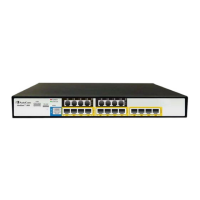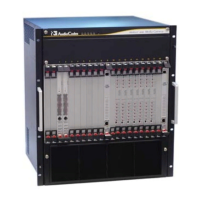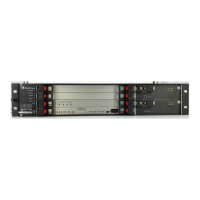SIP User's Manual 742 Document #: LTRT-12804
Mediant 800 MSBG
Parameter Description
Notes:
For this parameter to take effect, a device reset is
required.
If the device is located in a network subnet which is
connected to other gateways using a router that uses
Virtual Router Redundancy Protocol (VRRP) for
redundancy, then set this parameter to 0 or 2.
Web: RTP Base UDP Port
EMS: Base UDP Port
[BaseUDPport]
Lower boundary of the UDP port used for RTP, RTCP (RTP
port + 1) and T.38 (RTP port + 2). The upper boundary of
the UDP port range is the Base UDP Port + 10 * number of
the device's channels.
The range of possible UDP ports is 6,000 to 64,000. The
default base UDP port is 6000.
For example, if the Base UDP Port is set to 6000, then 1)
one channel may use the ports RTP 6000, RTCP 6001, and
T.38 6002, 2) another channel may use RTP 6010, RTCP
6011, and T.38 6012, etc.
The UDP port range is as follows:
BaseUDPport to BaseUDPport + 255*10
Notes:
For this parameter to take effect, a device reset is
required.
The UDP ports are allocated randomly to channels.
You can define a UDP port range per Media Realm (see
''Configuring Media Realms'' on page 109).
If RTP Base UDP Port is not a factor of 10, the following
message is generated: 'invalid local RTP port'.
For detailed information on the default RTP/RTCP/T.38
port allocation, refer to the Product Reference Manual.
EMS: No Op Enable
[NoOpEnable]
Enables or disables the transmission of RTP or T.38 No-Op
packets.
[0] = Disable (default)
[1] = Enable
This mechanism ensures that the NAT binding remains
open during RTP or T.38 silence periods.
EMS: No Op Interval
[NoOpInterval]
Defines the time interval in which RTP or T.38 No-Op
packets are sent in the case of silence (no RTP/T.38 traffic)
when No-Op packet transmission is enabled.
The valid range is 20 to 65,000 msec. The default is 10,000.
Note: To enable No-Op packet transmission, use the
NoOpEnable parameter.
EMS: No Op Payload Type
[RTPNoOpPayloadType]
Determines the payload type of No-Op packets.
The valid range is 96 to 127 (for the range of Dynamic RTP
Payload Type for all types of non hard-coded RTP Payload
types, refer to RFC 3551). The default value is 120.
Note: When defining this parameter, ensure that it doesn't
cause collision with other payload types.

